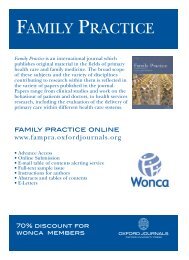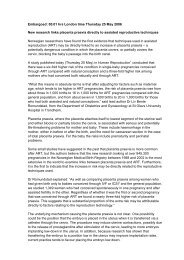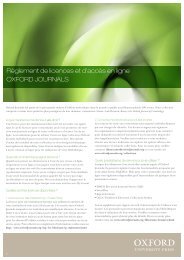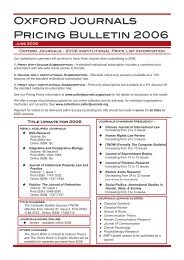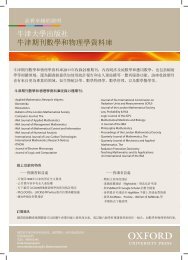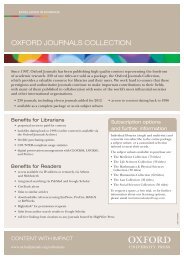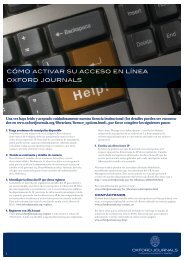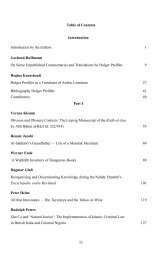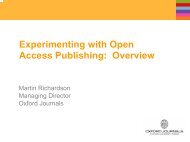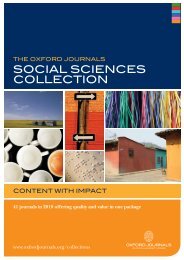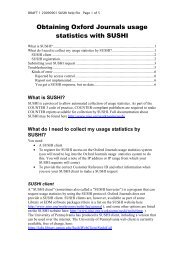Download the ESMO 2012 Abstract Book - Oxford Journals
Download the ESMO 2012 Abstract Book - Oxford Journals
Download the ESMO 2012 Abstract Book - Oxford Journals
Create successful ePaper yourself
Turn your PDF publications into a flip-book with our unique Google optimized e-Paper software.
Annals of Oncology<br />
Conclusion: The detection of CTC for <strong>the</strong> diagnosis of adenocarcinoma in case of<br />
tumours of <strong>the</strong> pancreas is a technique feasible, non-invasive, with a satisfactory<br />
diagnostic yield. The results of this pilot study, <strong>the</strong> continued progress in <strong>the</strong> analysis<br />
of CTC and a confirmation of this results in a higher independent population could<br />
allow us to propose this procedure in a first diagnostic step.<br />
Disclosure: All authors have declared no conflicts of interest.<br />
768 GEMOX PLUS ERLOTINIB FOR THE TREATMENT OF<br />
METASTATIC PANCREATIC ADENOCARCINOMA<br />
T. Füreder 1 , G.V. Kornek 1 , I. Kührer 2 , C. Zielinski 3 , J. Klech 1 , W. Scheithauer 1<br />
1 Internal Medicine I, Medical University of Vienna, Vienna, AUSTRIA, 2 Surgery,<br />
Medical University of Vienna, Vienna, AUSTRIA, 3 Department of Medicine I and<br />
Clinical Division of Oncology, Medical University of Vienna and Central European<br />
Cooperative Oncology Group (CECOG), Vienna, AUSTRIA<br />
Introduction: Based on demonstration of a significant improvement in overall<br />
survival in a placebo-controlled phase III trial, gemcitabine in combination with<br />
erlotinib has been approved for <strong>the</strong> treatment of metastatic pancreatic cancer.<br />
In patients with good performance status, gemcitabine combination chemo<strong>the</strong>rapy,<br />
i.e. with oxaliplatin (GEMOX) is commonly being used. Although <strong>the</strong>re is some<br />
evidence that GEMOX plus erlotinib is beneficial in a subgroup of patients compared<br />
to GEMOX alone in cholangiocellular carcinoma no such data exist for pancreatic<br />
cancer. Thus, we performed this retrospective analysis in unselected patients to<br />
investigate <strong>the</strong> efficacy and safety of this chemo<strong>the</strong>rapy regimen.<br />
Patients and methods: Forty-four patients with metastatic adenocarcinoma of <strong>the</strong><br />
pancreas receiving off-protocol GEMOX in combination with erlotinib at a single<br />
institution between January 2006 and September 2011 were included in this analysis.<br />
Data collection included baseline demographic, clinical and toxicity data as well as<br />
objective response according to RECIST criteria, progression-free survival (PFS) and<br />
overall survival (OS).<br />
Results: A total of 44 patients were included in this study. The mean age was 60.5<br />
years, and <strong>the</strong> median ECOG performance score was 1 (range, 0-1). GEMOX in<br />
combination with erlotinib was first line regimen in 84% of <strong>the</strong> patients. Clinical<br />
response and disease stabilization was achieved in 45% of <strong>the</strong> patients. The median<br />
PFS was 4 months (range 0.5-43) and median overall survival was 9.6 months (range<br />
0.7-54.7). However, <strong>the</strong> subgroup of 20 patients, who benefited from this regimen in<br />
terms of abrogation of progression, had a PFS of 11.2 and an OS of 15.4 months.<br />
Myelosuppression was <strong>the</strong> most frequent side effect. The most common severe<br />
nonhematological toxicity was diarrhea (5/44).<br />
Conclusions: These data suggest that <strong>the</strong> combination of GEMOX plus erlotinib is<br />
safe and active in about half of <strong>the</strong> patients treated with this regimen. Identification<br />
of (bio)markers would be desirable in order to be able to select patients, who are<br />
most likely to benefit from this <strong>the</strong>rapeutic strategy.<br />
Disclosure: All authors have declared no conflicts of interest.<br />
769 CYCLIN E1 SUPPRESSION CONTRIBUTES TO<br />
SORAFENIB-INDUCED APOPTOSIS IN HEPATOCELLULAR<br />
CARCINOMA (HCC)<br />
C. Hsu 1 ,D.Ou 2 , Y. Cheng 3 ,Y.Lin 1 , Y. Chang 4 ,K.Yeh 2 , A. Cheng 5<br />
1 Department of Oncology, National Taiwan University Hospital, Taipei, TAIWAN,<br />
2 Graduate Institute of Oncology, National Taiwan University College of Medicine,<br />
Taipei, TAIWAN, 3 Gradualte Institute of Medical Technology, National Taiwan<br />
University College of Medicine, Taipei, TAIWAN, 4 Oncology, National Taiwan<br />
University Hospital, Taipei, TAIWAN, 5 Internal Medicine, National Taiwan<br />
University Hospital, Taipei, TAIWAN<br />
Background: We have found that sorafenib can inhibit cyclin E1 expression in HCC<br />
cells, which is independent of <strong>the</strong> inhibitory effects of sorafenib on mitogen-activated<br />
protein kinase-extracellular signal-regulated kinase/extracellular signal-regulated<br />
kinase signaling. The present study sought to clarify <strong>the</strong> role of cyclin E1 in<br />
sorafenib-induced apoptosis in HCC.<br />
Methods: A panel of HCC cell lines, including sorafenib-sensitive (Huh-7, HepG2)<br />
and sorafenib-resistant (Hep3B, Huh-7R and HepG2R) HCC cells, was tested.<br />
Apoptosis was measured by flow cytometry. Knockdown of cyclin E1 expression<br />
were used by RNA-interference. Over-expression of cyclin E1 was done by transient<br />
transfection of pCMV6-AC-GFP-CCNE1 vector (RG204289; Origene Technologies).<br />
The activity of pertinent signaling pathways, cell cycles-related proteins and<br />
expression of apoptosis-related proteins were measured by Western blotting.<br />
Results: Cyclin E1 mRNA and protein expressions were suppressed after sorafenib<br />
treatment in sorafenib-sensitive but not in sorafenib-resistant HCC cells. The changes<br />
in cyclin E2 or cyclin D1 expression after sorafenib treatment were not correlated<br />
with sorafenib sensitivity of HCC cells. Knockdown of cyclin E1 expression reversed<br />
<strong>the</strong> resistance of HCC cells to sorafenib in terms of cell growth and apoptosis<br />
induction, whereas over-expression of cyclin E1 increased <strong>the</strong> resistance of HCC cells<br />
to sorafenib. Combination of sorafenib and <strong>the</strong> cyclin-dependent kinase (CDK)<br />
inhibitor flavopiridol synergistically inhibited cell growth and induced apoptosis in<br />
HCC cells. The synergistic efficacy was associated with suppression of Bcl-XL<br />
expression in HCC cells.<br />
Conclusion: Cyclin E1 expression in HCC cells may serve a predictive biomarker<br />
for treatment efficacy. Combination of sorafenib and CDK inhibitors may improve<br />
<strong>the</strong> <strong>the</strong>rapeutic efficacy of sorafenib in HCC. (Supported by grants:<br />
NSC100-2314-B-002-058-MY3, NSC101-2325-B-002-039, and<br />
NHRI-EX101-9911BC)<br />
Disclosure: C. Hsu: Dr Chiun Hsu is a member of <strong>the</strong> speaker’s bureau of<br />
Bayer-Schering Pharma. A. Cheng: Dr Ann-Lii Cheng is a consultant for<br />
Sanofi-Aventis Inc.; Pfizer, Bayer Schering Pharma; Bristol-Myers Squibb (Taiwan)<br />
Ltd.; Boehringer Ingelheim Taiwan Limited; Novartis Inc. All o<strong>the</strong>r authors have<br />
declared no conflicts of interest.<br />
770 SORAFENIB VERSUS CAPECITABINE IN THE MANAGEMENT<br />
OF ADVANCED HEPATOCELLULAR CARCINOMA<br />
M. Abdelwahab 1 , M. Shaker 2 , S. Abdelwahab 1 , M. Elbassiouny 1 , M. Ellithy 1 ,<br />
O. Abdelrhman 1<br />
1 Clinical Oncology, Ain Shams University, Cairo, EGYPT, 2 Tropical Medicine,<br />
Ain Shams University, Cairo, EGYPT<br />
Background: The only approved systemic <strong>the</strong>rapy for patients with advanced<br />
hepatocellular carcinoma (HCC) till now is sorafenib. a preliminary study suggested<br />
that capecitabine, an oral fluoropyrimidine may be effective in advanced HCC. We<br />
have tested this hypo<strong>the</strong>sis in this phase 2 study.<br />
Methods: In this single centre, phase 2, open label trial, we randomly assigned 52<br />
patients with advanced HCC who had not received previous systemic treatment to<br />
receive ei<strong>the</strong>r sorafenib (at a dose of 400 mg twice daily) or capecitabine 1000 mg/m 2<br />
twice daily (day 1-day 14). Primary outcomes were progression free survival.<br />
Secondary outcomes included <strong>the</strong> overall survival and safety.<br />
Results: Median overall survival was 7.05 months in <strong>the</strong> sorafenib group and 5.07<br />
months in <strong>the</strong> placebo group (hazard ratio in <strong>the</strong> capecitabine group, 2.36; 95%<br />
confidence interval, 1.174-4.74; P < 0.016). The median progression free survival was<br />
6 months in <strong>the</strong> sorafenib group and 4 months in <strong>the</strong> capecitabine group (P < 0.005).<br />
Three patients in <strong>the</strong> sorafenib group (11.5%) and 1 patient in <strong>the</strong> capecitabine<br />
group (3%) had a partial response; one patient (3%) had a complete response in <strong>the</strong><br />
sorafenib group. hand–foot skin reaction was more frequent in <strong>the</strong> sorafenib group,<br />
hyperbilirubinemia was more common in <strong>the</strong> capecitabine group and diarrhea was<br />
equivalent between both groups.<br />
Conclusions: In patients with advanced HCC, capecitabine mono<strong>the</strong>rapy is inferior<br />
to sorafenib in terms of median progression free survival and overall survival and it<br />
should not be used alone for <strong>the</strong> treatment of advanced HCC but ra<strong>the</strong>r combination<br />
<strong>the</strong>rapy of capecitabine plus sorafenib should be considered for fur<strong>the</strong>r randomized<br />
clinical trials.<br />
Disclosure: All authors have declared no conflicts of interest.<br />
771 LIVER SPECIFIC GRADED PROGNOSTIC ASSESSMENT CAN<br />
PREDICT THE OUTCOME FOR PATIENTS WITH BRAIN<br />
METASTASES FROM HEPATOCELLULAR CARCINOMA<br />
S. Lim 1 , S. Lee 1 , K. Han 2 , H. Choi 1<br />
1 Medical Oncology, Severance Hospital, Seoul, KOREA, 2 Gastroenterology,<br />
Severance Hospital, Seoul, KOREA<br />
Background: After <strong>the</strong> introduction of sorafenib which showed prolongation of<br />
survival in patients with advanced HCC, <strong>the</strong> incidence of brain metastasis seemed to<br />
increase. Assessment of prognostic factors might useful to decide treatment in<br />
patients with brain metastases. Although diagnosis-specific Graded Prognostic<br />
Assessment (GPA) has been identified for several cancer types, optimal treatment<br />
strategy for brain metastasis from HCC has not been well established.<br />
Methods: A total of 128 HCC patients were newly diagnosed with brain metastasis at<br />
Yonsei University Health Center between 1995 and 2011. Using SPSS program,<br />
univariate and multivariate analyses of <strong>the</strong> prognostic factors were performed. With<br />
<strong>the</strong> P value less than 0.10 as cutoff value, <strong>the</strong> significant prognostic factors were used<br />
to develop <strong>the</strong> HCC specific-GPA (HCC-GPA).<br />
Result: The median overall survival after brain metastasis in all patients was only 6.1<br />
weeks (95% confidence interval: 4.8-7.4 week). Significant prognostic factors were <strong>the</strong><br />
presence of extracranial lesion, and Child-Pugh-Class score. Using those variables, we<br />
newly developed HCC-GPA: extracranial metastasis (Yes: 0, No: 1 point), and<br />
Child-Pugh-Score (C:0, B:1, A:2 point). The median survival time from brain metastasis<br />
were significantly separated by HCC-GPA grouping (3.1 weeks in group 1 (HCC-GPA<br />
score 0 or 1.0, N = 50), 8.0 weeks in group 2 (HCC-GPA score 2.0, N = 55), and 22.0<br />
weeks in group 3 (HCC-GPA score 3.0, N = 13); p< 0.001 by log rank test).<br />
Conclusion: Although <strong>the</strong> overall prognosis of patients with brain metastasis from<br />
HCC is dismal, <strong>the</strong> present data showed that newly developed HCC-GPA score can<br />
Volume 23 | Supplement 9 | September <strong>2012</strong> doi:10.1093/annonc/mds398 | ix253



